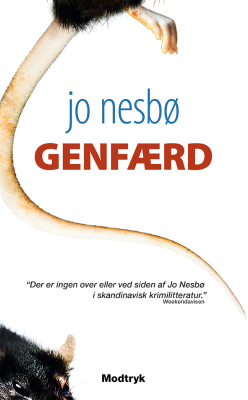
Inside the Network
engelsk
Business
Begrænset tilbud
2 måneder kun 19 kr.
Derefter 99 kr. / månedOpsig når som helst.
- 20 lydbogstimer pr. måned
- Podcasts kun på Podimo
- Gratis podcasts
Læs mere Inside the Network
Welcome to the inside track of cybersecurity entrepreneurship. We bring you the best founders, operators, and investors building the future of cybersecurity.
Alle episoder
21 episoderSanjay Beri: Playing the long game and building Netskope into a public cybersecurity powerhouse
In this episode of Inside the Network, we sit down with Sanjay Beri, Founder and CEO of Netskope, a company that sits at the intersection of AI, data security, and global edge networking. Over thirteen years, Sanjay scaled Netskope to 4,000+ customers (including 30% of the Fortune 100), 3,000+ employees across 30 countries, and ultimately took the company public in September 2025 in one of the year’s standout cybersecurity IPOs. Sanjay’s journey is a masterclass in playing the long game. From growing up in Canada selling door-to-door with his mom, where he learned grit and resilience, to working at Microsoft during the early internet era, to becoming one of Juniper’s youngest VPs running a large business, Sanjay built the rare blend of product, go-to-market, and leadership muscle it takes to build at scale. We talk about the origins of Netskope, why it was never “just a CASB,” how Sanjay recruited world-class early engineers and built a high-trust culture, and what product-market fit looked like in the first chapter of the company. He also breaks down some of Netskope’s biggest bets, including building its own edge cloud instead of relying on public cloud networks, and launching AI Labs years before today’s GenAI wave. Whether you’re building a cyber startup, scaling into the enterprise, or studying what it takes to go from zero to IPO, this episode is packed with hard-earned lessons on conviction, the importance of building a winning culture, and endurance.
Dino Boukouris & Sam Bronstein: How AI, identity, and cloud security defined 2025 and what 2026 holds for founders
In this special year-end episode of Inside the Network, we’re joined by two of the most trusted strategic advisors in cybersecurity - Dino Boukouris, Managing Partner at Altitude Cyber, and Sam Bronstein, Partner at AXOM Partners. Between them, they’ve worked on billions of dollars in cybersecurity M&A, helped founders navigate exits to the world’s largest tech companies, and advised the CEOs behind some of the biggest public and private deals in the industry. In this episode, which also happens to be the 20th episode of Inside the Network, we break down what really happened across the cybersecurity landscape in 2025, from customer buying patterns and budget constraints to the $96B in M&A deal volume. Dino and Sam share insights on what’s driving consolidation, how buyers think about valuation and timing, and what defines a hot company in 2026 (hint: it’s not just growth). We talk about how mega-deals like Wiz and CyberArk are reshaping competitive dynamics in the industry, why SASE, identity, and security for AI have been the most active M&A themes, and what founders need to understand about building relationships with buyers long before they’re ready to exit. Sam and Dino explain that founders who achieve the best outcomes usually build relationships with potential acquirers over many years, and break down why many late-stage founders are likely to choose acquisition over IPO in the coming cycle. We close with tactical advice for founders heading into 2026: how to think about your board and investors, what metrics you’ll be judged on, and how to align your capital strategy with your long-term goals. And yes, we also talk about race cars, zero interest rates, outcome-based pricing, and what Palo Alto Networks might buy next.
Dean Sysman: Betting on a boring problem and scaling Axonius past $100M ARR
In this episode of Inside the Network, we sit down with Dean Sysman, co-founder and CEO of Axonius, one of the fastest-growing cybersecurity companies in the world. From struggling with his first startup to building a category-defining unicorn valued at $2.6 billion, Dean’s journey is a raw, insightful, and unfiltered look into what it really takes to build in security. Before founding Axonius, Dean co-founded Cymmetria, a Y Combinator-backed deception startup that despite all the efforts, didn’t end up leading to a successful outcome. That experience didn’t stop him; it made him more grounded, more strategic, and more deliberate. Dean 2.0 didn’t enter a hot market. Instead, he went after a boring but foundational problem everyone had, but no one wanted to touch - cyber asset visibility. In just under five years, Axonius surpassed $100M in ARR and raised over $600 million to fund growth and acquisitions. Dean’s path has been unconventional from the start. He taught himself to code at 12, won an international robotics competition at 15, and led a team in Unit 8200 by 21. In the military, he learned responsibility the hard way: “If you fail, no one else is coming to help.” That mindset became the core of his entrepreneurial approach. In this conversation, Dean opens up about what most people get wrong about Unit 8200, why the army’s bureaucracy actually helped him understand enterprise sales, and how he turned a failed venture into the insight that led to Axonius. We talk about the early days of building Axonius, the decision to go deep into a “Toyota Camry” problem, and how he convinced two close friends from Unit 8200 to bet on a boring idea that became a unicorn. Dean breaks down the evolution of cyber asset management, what it took to define a new category, and why timing and value communication matter more than tech novelty. He also shares lessons from Axonius’ first acquisition, Cynerio, and what founders need to understand about getting M&A right: culture, timing, and strategic alignment matter far more than valuation spreadsheets.
Tomer Weingarten: From cyber outsider to building SentinelOne into a $1B ARR category leader
In this episode of Inside the Network, we sit down with Tomer Weingarten, Co-Founder and CEO of SentinelOne, one of the fastest-growing cybersecurity companies. From writing code and designing the company’s first UI himself, to taking SentinelOne public and crossing $1 billion ARR, Tomer’s journey is a rare combination of technical excellence, grit, and long-term conviction. Tomer didn’t grow up surrounded by startup founders or Silicon Valley mentors. He was raised in a small Israeli town with few resources and found computers as a creative escape. He met his SentinelOne co-founder, Almog Cohen, in second grade, began hacking games as a teenager, and exited his first startup at just 24 making millions of dollars. Then, in an unusual move, he spent all the money to reset, stay grounded and hungry to build something big. That big ambition would become SentinelOne. When SentinelOne launched in 2013, most endpoint vendors were still focusing on signature-based antivirus, and the idea of autonomous, behavior-based prevention powered by AI sounded like science fiction. Tomer wanted to reimagine cyber defense from the ground up. The company’s early traction didn’t come easy, and it took several years of heads-down engineering effort to get to the point when the company signed its first customer and investors stopped being skeptical. Tomer believed the problem wasn’t being solved deeply enough, and he stayed patient while the market caught up. Tomer shares how he navigated the “wartime CEO” moments like fighting off rivals with 10 times the budget, managing internal politics, and surviving near-death moments during fundraising. He reflects on how leadership styles evolve under pressure, and how the discipline of writing down decisions helped him become a better CEO. He also breaks down how founders confuse early ARR with true product-market fit, and why most security companies today are in his opinion workflow wrappers, not tech companies. We also explore Tomer’s views on the LLM hype cycle and why he believes most of the AI noise in cybersecurity today is more marketing than the actual deep tech. Tomer believes that true moat lies in foundational models trained on real, curated telemetry, and in solving hard tech problems, not just ChatGPT integration. This episode is a deeply personal look at what it takes to build enduring companies in cybersecurity. This is one of our most honest, unfiltered founder conversations, and if you care about the art of company-building, you won’t want to miss it.
Sumit Dhawan: Leading Proofpoint’s AI evolution and building toward $5B in ARR
In this episode of Inside the Network, we sit down with Sumit Dhawan, CEO of Proofpoint, one of the largest private cybersecurity companies in the world. With over $2 billion in ARR, Proofpoint protects 85 of the Fortune 100 and is on a bold path toward $5 billion in revenue by 2030. Sumit’s journey is a masterclass in modern leadership. Having graduated with degrees in engineering and business from IIT Roorkee, the University of Minnesota, and the University of Florida, Sumit led major business lines at Citrix and VMware, including overseeing VMware’s $70 billion divestiture to Broadcom, before making the leap to cybersecurity. In 2023, he joined Proofpoint as CEO and began executing an ambitious strategy: consolidate the sprawl of human-centric security, go deep instead of broad, and prepare the company for its next chapter of growth. In our conversation, Sumit shares why he believes empathy is the most underrated CEO trait, how acting like a founder, even inside large enterprises, shaped his leadership, and what it means to have “Apple Watch governance” under Thoma Bravo. He explains how Proofpoint has evolved from email security leader to a broader platform for human and data protection, including its acquisitions of Tessian (AI-native email protection), Hornetsecurity (MSP-focused email security), and Normalyze (DSPM). Sumit also pulls back the curtain on the AI threat landscape, including how prompt injection attacks are already targeting copilots and agents, why AI is both supercharging attackers and empowering defenders, and how Proofpoint built intent-based detection models to defend against sophisticated zero-link phishing. Finally, he lays out three categories of viable cybersecurity startups today: gap-fillers, AI defenders, and category disruptors, and why the last two are more likely to be successful. Whether you’re scaling a cyber startup, selling into the enterprise, or navigating PE-backed growth, this episode is full of hard-earned wisdom from a leader who’s operated at every level of the stack.
Vælg dit abonnement
Begrænset tilbud
Premium
20 timers lydbøger
Podcasts kun på Podimo
Gratis podcasts
Opsig når som helst
2 måneder kun 19 kr.
Derefter 99 kr. / måned
Premium Plus
100 timers lydbøger
Podcasts kun på Podimo
Gratis podcasts
Opsig når som helst
Prøv gratis i 7 dage
Derefter 129 kr. / måned
2 måneder kun 19 kr. Derefter 99 kr. / måned. Opsig når som helst.















































